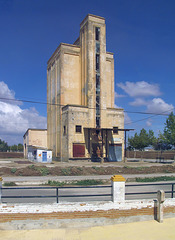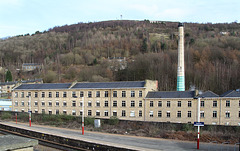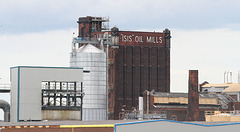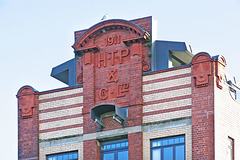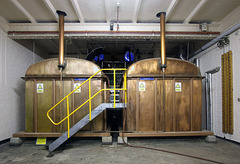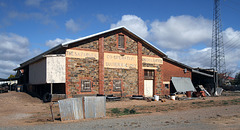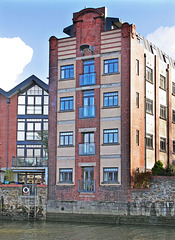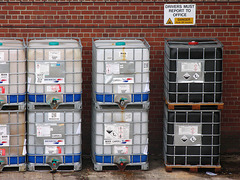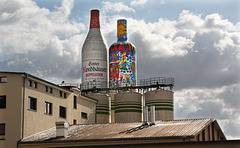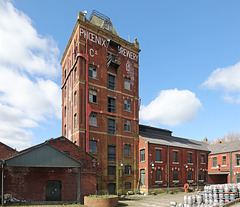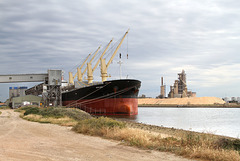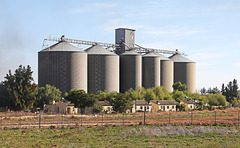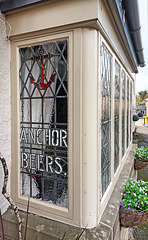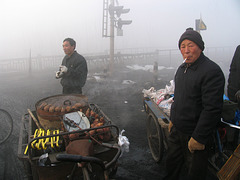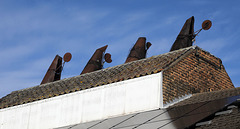
Food Industry
Clarence Mills
| |
|
|
The original Clarence Mills alongside the River Hull were built in 1888. Badly damaged by bombing in WWII they were rebuilt and continued to mill flour until 2005. In 2015 the mills were demolished to make way for a 23 floor hotel and casino.
Campillos
| |
|
|
Disused municipal grain silo at Campillos in southern Spain, seen from a passing train.
Bailey Hall Mill
| |
|
|
|
The Halifax Flour Society was formed on 1st May 1847 to provide a co-operative corn mill following discontent against the Corn Laws, corn dealers' prices, and because much flour was adulterated. The Society sold to the public through agents. Initially 2,800 people bought £1 shares, and the Society bought a mill at Bailey Hall from where the first batch of cheap flour was sold in 1848. When the Bailey Hall mill became too small, a new 6-storey Bailey Hall was built in 1862. This was one of the most modern grain mills at the time and was opened with a party for 1,400 people on April 7, 1863. Later the Society bought more land at Bailey Hall and a new mill was opened in 1880. This is the building seen here. The Society was sold to the Co-operative Wholesale Society in 1915 and the Bailey Hall mill was sold to Paton & Baldwin. This mill eventually closed for flour production in the 1930s. It is now occupied by Nestlé.
"Isis" oil mills
| |
|
|
The Isis Oil Mill was built in 1912 for historic Hull business Wray, Sanderson and Co. The site become the heart of Hull’s oil seed milling industry. The silo is listed Grade II but much of the surrounding refinery was demolished in 2019.
HTP & Co Ltd
| |
|
|
Former warehouse of millers Hosken, Trevithick, Polkinhorn & Co Ltd at Truro. Now flats.
The Hosken family had been corn millers in Cornwall since the 18th century. The business thrived throughout the 19th century but the succession to William Hosken was a worry to him. Negotiations were held with the Trevithick brothers witha view to a partnership and at the same time the ambitious Samuel James Polkinhorn of Truro married into the Rosewarne family who were related to the Hoskens by marriage
Just five months after the death of William Hosken in 1890, the largest conglomerate ever formed in Cornwall emerged. It was complicated and led by a number of men who didn’t really know each other, nor how to run the business. Sam Hosken, the most respected director, was made the unwilling chairman but seldom attended a meeting. The other directors were Trevithick brothers on one side and the Hosken camp, including Rosewarnes and Polkinhorns by marriage, on the other; they would never agree. Years later, John Rosewarne described the family-controlled feudal company as an unholy alliance.
Buoyed up by shareholders’ cash and incredible borrowings, the business continued until 1936 when Spillers bought the milling side and the trading name. It continued in the hands of the same Hayle-based families for a further 40 years as Farm Industries Ltd.
Lager works
| |
|
A panorama of the Moss Side brewery in Manchester, operated by Heineken.
Beer has been brewed on the site since 1875, when it was known as the Albert Brewery, named after Queen Victoria's husband. The brewery made ales and stouts that were supplied to pubs around Manchester, including the Cross Keys in Salford and the Shah Inn in Hulme.
It was later sold to John Henry Lees, who changed its name to the Moss Side Brewery. In 1907 it was renamed the Royal Brewery in honour of King Edward VII's visit to the city.
The brewery changed hands again in 1913 when Lees' company went into liquidation and it was later absorbed by another local brewery, Walker & Homfrays Ltd.
The UK's first lager, Red Tower, was brewed here in 1927, named after the building's most striking feature. The brewery took its name too in 1933, becoming the Red Tower Lager Brewery.The drink was a hit in London where it was sold in upmarket restaurants and dispensed from wooden cabinets that were wheeled to diners' tables.
Sales suffered during the Second World War when many restaurants in the capital shut down - but in Manchester, the arrival of American troops created plenty of thirst for the drink locally.
In 1955 the brewery became known as the Royal Moss Side Brewery and was bought by Scottish Brewers a few years later to produce their own McEwan Younger Lager. The site later began to brew Harp lager in 1962. By 1985 it was producing a million hectolitres a year (nearly 176 million pints). Today it can produce five times that amount, churning out nearly 18 million pints a week.
After several more changes of ownership, Heineken took over the site in 2008. Today the main beers produced and packaged there are Foster's and Kronenbourg 1664.
Coolers
| |
|
Wort coolers Nos 1 & 2 at the Robinson's brewery in Stockport. These have since been taken out of use with the modernisation of the brewery but still remain to be seen on brewery tours.
Butter Factory
| |
|
|
The small town of Orroroo in South Australia, 200km north of Adelaide saw a boom in dairying following the damming of the Pekina Creek and the development of an irrigation scheme serving 40 farms on the eastern flats below the town. A butter factory was opened in 1907 and the product marketed as Walloway Butter. This was exported as far a London although 70% went to Broken Hill. In 1919 the business was acquired by the South Australian Farmers Union and this new factory was opened in 1921 at a cost of £8,000. This factory closed in 1970 and milk was subsequently sent by road to Gawler.
Hosken, Trevithick, Polkinhorn & Co Ltd. 1911
| |
|
|
Former warehouse of millers Hosken, Trevithick, Polkinhorn & Co Ltd at Truro. Now flats.
The Hosken family had been corn millers in Cornwall since the 18th century. The business thrived throughout the 19th century but the succession to William Hosken was a worry to him. Negotiations were held with the Trevithick brothers witha view to a partnership and at the same time the ambitious Samuel James Polkinhorn of Truro married into the Rosewarne family who were related to the Hoskens by marriage
Just five months after the death of William Hosken in 1890, the largest conglomerate ever formed in Cornwall emerged. It was complicated and led by a number of men who didn’t really know each other, nor how to run the business. Sam Hosken, the most respected director, was made the unwilling chairman but seldom attended a meeting. The other directors were Trevithick brothers on one side and the Hosken camp, including Rosewarnes and Polkinhorns by marriage, on the other; they would never agree. Years later, John Rosewarne described the family-controlled feudal company as an unholy alliance.
Buoyed up by shareholders’ cash and incredible borrowings, the business continued until 1936 when Spillers bought the milling side and the trading name. It continued in the hands of the same Hayle-based families for a further 40 years as Farm Industries Ltd.
Drivers must report to office
Distillery
Phoenix Brewery
| |
|
|
The original Phoenix Brewery Company at Heywood was registered in 1874 and had something of a chequered history, going bankrupt three times. The last occasion was in 1939, when about 120 pubs were owned, prompting its purchase and closure by the Cornbrook Brewery of Old Trafford. The equipment was sold off to aid the war effort but the tower today remains an impressive sight both inside and out. Within everything is in place, apart from the various vessels - even painted signs denoting the hop rooms . The current microbrewery of the same name occupies the old maltings while the Victorian offices have been restored for occasional functions.
Silloth
| |
|
The port of Silloth looking across the outer harbour to the dock gates. This is one of the smaller harbours administered by Associated British Ports. Cargoes imported here include wheat, fertiliser and molasses. The new dock opened in June 1885 and, two years later, Carr’s flour mill was built alongside it.
In 1836 Jonathan Dodgson Carr started milling flour at the Carr’s Silloth Mill located in Cumbria. This was to supply flour for his famous Carr’s Table Water biscuit factory. Within 15 years Carr’s of Carlisle had become one of the largest baking businesses in Britain. It is here at Silloth, where all the retail range of bags of Carr’s flour are made and packed. 50% of Silloth Mill's wheat requirement is delivered by ship in loads of up to 3500 tonnes. The business is now owned by Whitworth Holdings Ltd.
Grain and cement
| |
|
|
The grain silos at berth 27 of the inner harbour at Port Adelaide can supply wheat and barley to the ship loaders at up to 700 tonnes per hour. Viterra also has a newer deep water terminal in the outer harbour. In the right background is the works of Adelaide Brighton Cement. The ship is the Singapore registered bulk carrier 'Ocean Hiryu'.
Silos
Anchor Beers
| |
|
Advertisement for beer on the window of the Miners Arms at Eyam. 'Anchor Beers' refers to the long lost Sheffield-based, Hope and Anchor Breweries which became part of Charrington United Breweries in 1962.
Hot potatoes
| |
|
|
|
At the level crossing outside the locomotive depot in Pingdingshan the fast food offering included this mobile hot sweet potato stall. Just the thing for breakfast on a foggy morning.
Vents
| |
|
|
The Grimsby docks area continues to support a wide range of fish and seafood processing businesses. I was surprised to see that there was a good number of active smokehouses which were recognisable by the smoke vents on the roof. These are on the Riby Street premises of Premier Seafoods. The tails to point them away from the wind are certainly in need of a little attention.
Jump to top
RSS feed- Latest items - Subscribe to the latest items added to this album
- ipernity © 2007-2024
- Help & Contact
|
Club news
|
About ipernity
|
History |
ipernity Club & Prices |
Guide of good conduct
Donate | Group guidelines | Privacy policy | Terms of use | Statutes | In memoria -
Facebook
Twitter


